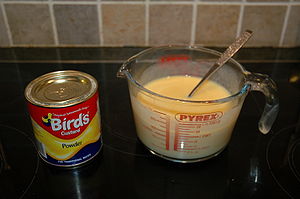- Bird's Custard
-
Bird's Custard (a brand name) is the original version of what is known generically as custard powder. It is a cornflour (US cornstarch)-based powder which thickens to form a custard-like sauce when mixed with milk and heated to a sufficient temperature. Bird's Custard was first formulated and first cooked by Alfred Bird in 1837, because his wife was allergic to eggs,[1] the key ingredient used to thicken traditional custard.
In some regions, such as Australia and some parts of the United Kingdom, the popularity of this type of dessert is such that it is simply known as "custard." In such cases, general usage of the word may be more likely to refer to the "Bird's" custard rather than to the traditional egg-based variety.
In recent years, "instant" versions (containing powdered milk and sugar and requiring only hot water) and ready-made custard in tins, plastic pots and cartons have also become popular.
A food and drink survey carried out in 2000 found 99% of customers recognised the brand,[citation needed] which accounts for 45% of the custard consumed in the UK.[citation needed] Bird's Custard is also exported to several countries around the world, including the United States, where it is popular among several ethnic groups. Many ethnic and specialty stores across the United States sell the product.[citation needed] In Canada, Bird's Custard can often be found in many popular grocery supermarkets.
In addition to the Bird's brand, generic cornflour-based custards are widely available.
Controversy
Many Bird's products, such as its instant custard powder, contain hydrogenated vegetable oil,[2] a product now banned in some countries due to health concerns relating to heart disease.[3]
Alfred Bird and Sons Ltd.
After he discovered his custard was popular, Bird formed Alfred Bird and Sons Ltd. in Birmingham. By 1843, the company was also making the newly invented baking powder and, by 1844, was promoting custard powder nationally. By 1895, the company was producing Blancmange powder, jelly powder, and egg substitute. In World War I, Bird's Custard was supplied to the British armed forces.
The company was one of the early users of promotional items and colourful advertising campaigns. The famous 'three bird' logo, however, was relatively late in arriving, only introduced in 1929.
World War II saw rationing and serious production limits. Shortly after the war, Bird's was purchased by the General Foods Corporation, which was itself taken over by Philip Morris in the 1980s and merged into Kraft Foods. Although the Bird's Custard product remains, the company itself is now just a brand. In late 2004, Kraft sold Bird's Custard and some other Kraft brands to Premier Foods, who are the current owners.[4][5]
The original custard factory has long ceased to exist, but the larger factory Bird's opened in Gibb Street remains (production was relocated to Banbury in 1964, along with the factory gates, featuring the company logo), and has been adapted as the Custard Factory arts centre.
In 1981, a dust explosion occurred at the Banbury factory when corn starch powder mixed with air, forming an explosive mixture.[6]
References
- ^ "Alfred Bird"
- ^ http://www.mysupermarket.co.uk/ocado-compare-prices/Desserts/Birds_Instant_Custard_275g.html
- ^ "Deadly fats: why are we still eating them?". The Independent (London). 10 June 2008. http://www.independent.co.uk/life-style/health-and-families/healthy-living/deadly-fats-why-are-we-still-eating-them-843400.html. Retrieved 26 April 2010.
- ^ "Delight as Premier gets the cream of custard", manchesteronline.co.uk. Article dated 9 December 2004, retrieved 14 March 2006.
- ^ "Premier gobbles up Bird's Custard", bbc.co.uk. Article dated 10 December 2004, retrieved 14 March 2006.
- ^ "Corn Starch Dust Explosion at General Foods Ltd, Banbury, Oxfordshire - 18th November 1981". Great Britain: January, 1983. Occupational Health & Safety Information Service, UK. ISBN 0118836730
Categories:- British desserts
- Custard desserts
- Brand name desserts
- Companies based in Birmingham, West Midlands
- English inventions
- Premier Foods brands
- Imitation foods
Wikimedia Foundation. 2010.

